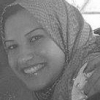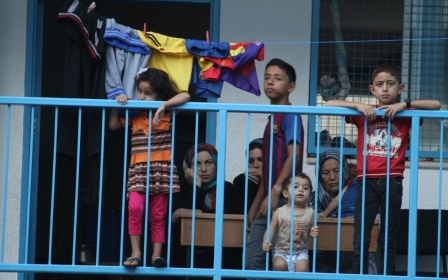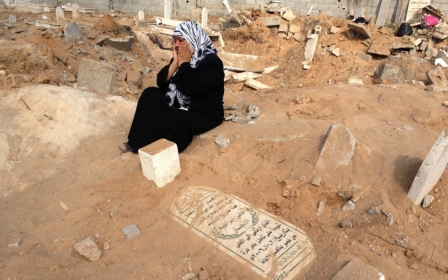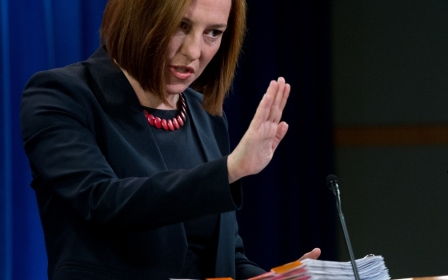Eid in a dystopian Gaza

On Monday evening, one hour after people broke their fast for the last time after a month, occasional calls and prayers from mosques announced that the next day would be the first day of Eid.
Usually, one would not be able to restrain her or his tears, as these moments have been always associated with glee and exultation.
This time, however, these moments were very sorrowful, and it is the first sad Eid I have ever witnessed in my lifetime.
Though war is not something new to us in Gaza - I myself survived two - in 2008-09 and 2012 - this is the scariest and most blood-curdling one.
While I was standing on the dark balcony searching inside myself for that typical feeling that I couldn’t find, I heard some children’s delightful voices repeating the Eid prayers after the Sheikh, laughing and running.
Since the beginning of the Israeli onslaught, we have been trapped indoors for very long days and nights. The central part of our life has been watching the sky turning grey and black with thick smoke during the day, and bright orange in the darkness of the night as a result of Israeli bombs and shelling. Now warplanes are dropping flare bombs, which have lit the entire neighbourhood. Its sight reminded me of fireworks during the 2011 New Year Eve I enjoyed in London.
Power drained
Early in the morning, I got a phone call from a news agency in South Africa asking me if I could do an interview about the Eid celebrations in Gaza in about two hours. I said yes.
Afterwards, when the call ended, I realised that the battery of my cellphone was dying, and it could hardly last for another 10 minutes. I luckily could get it charged using an external UBS battery. While it might be really embarrassing to speak about electricity amongst all this bloodshed, destruction and population transfer, it is - believe me - an indefinable chronic calamity. You need to charge your cellphone, your laptop, follow up the news, connect to the world, wash your long-accumulating clothes, operate the generator for household water-lifting - not to mention the refrigerator and all the food that has been spoiled.
We haven’t seen electricity for 72 hours, except for three hours during which I was sleeping, and this is how it has been since the frequent bombings of the only power plant in Gaza and lack of fuel supplies. Therefore, then, most of your time, energy and efforts are devoted to securing the very basic items (electricity, food, water, fuel, etc) that should be available and taken for granted.
Is it a privilege to still not be killed by the Israeli war machine? This is one of the many existential questions one may ask her/himself. I have heard a lot from people that we are also dying, but in a different way. Aunt would say: “We are dying very slowly. They are killing us very slowly.” People in Gaza are currently either getting butchered by the Israeli machinery or slowly dying. We are surviving a very severe condition and the word “survival” has been widely used in our communications.
Eid in Gaza
After one month of fasting, I can see neither the usual celebrations nor the exuberant preparations. People usually buy new clothes, various kinds of sweets and nuts, and toys for the children. Streets, shops and supermarkets are always so crowded and full of people. Parents usually take their children to visit relatives, play in playgrounds and the few simply equipped amusement parks, eat in restaurants and have a summer evening on the beach.
This time parents are weeping over their lost children, children are crying over their dead parents, and people are remembering their dead relatives or phoning those who are still alive but either staying in hospitals or UNRWA schools. Mass displacement continues across Gaza with over 215,000 Palestinians, nearly a quarter of a million, now seeking shelter in UNRWA schools, according to the UN Office for the Coordination of Humanitarian Affairs (OCHA) - not to mention the tens of thousands of Palestinians who have taken refuge in relatives’ and friends’ houses elsewhere in Gaza.
However, amidst such unbearable and unexplainable affliction, women in schools decided to collectively prepare the renowned Eid cookies with dates, teaching their children what resilience and life mean, and sending a powerful message of defiance and capable existence to the pathetic world.
The sole topic of conversation is the current barbarous offensive, its features and implications. We would share the tragic stories and the insufferable plight of how relatives and friends got slaughtered. Uncle Mohammed would speak about the martyrs’ corpses that are still under the rubble in Khuza village, east of Khan Younis, because the medical staff have been prevented from accessing the village to take the decomposed bodies.
Uncle Moner would mention the neighbour who got a phone call to instantly evacuate his house. As soon as he hanged up the call and rushed outside his house, a warplane killed him with a direct missile. My cousin Abed would distressfully comment: “He should not have answered any calls. His cellphone must have been off if he knows that he is wanted by the Israelis. They are using the mobile signals to locate the exact places of those they want to target. Don’t you recall that this is the same way they tried to kill Mohammed (our relative) in the 2012 onslaught.”
Meanwhile, my uncle’s wife Nima would get a phone call. She leaves her baby in my lap and keeps walking in the near hallway while anxiously answering the call. Two minutes later she would talk about her pregnant cousin who was brought dead from under the rubble. She added, “They felt a movement inside her belly and therefore they cut it open to get the fetus. He is now in the intensive care and his condition is very serious. Doctors say he might die due to the lack of oxygen during birth”. Different views about whether they should have opened her belly or not arise.
Uncle’s wife Rawaa would speak about the only baby survivor from Al- Batsh family, where the whole family of 18 members were completely wiped out. She said: “While people were searching under the rubble of Al-Batsh family, a man found a girl baby who was mysteriously protected except for some minor injuries. The man insisted to take the baby saying that he was the one who found her and she was a gift to him from Allah.”
My brother Mohammed would narrate what happened to his four friends who were killed together in our neighbourhood. I would not forget his reaction when he heard the news. He started hysterically hitting the walls and blankets and uttering, “Abdullah was eating with me yesterday. He liked the dessert that mum made and asked me to get him the recipe. We together visited our hospitalised friend Mohammed (he was hit by an Israeli missile that caused him severe burns and a broken leg. He has been in the intensive care). How can he be dead so soon? He is only 28! Who would take care of his wife and two children?”
With a heavy heart, I would also recall my colleague Abdullah, 22, known for his quick smile and good rapport with friends, who was killed in Al-Shajaeya massacre on 20 July by Israeli military forces. He was aspiring to be an international human rights lawyer for the sake of, as he always says, “exposing Israel’s crimes and violations of law”.
At 5pm we would go to visit my grandmother who lives 400 meters away from our house. We could see the broken streets and the completely destroyed houses. You cannot tell that one day it was a house except from the scattered remains of clothes and belongings. All what you can see are hills of debris of very tiny broken bricks as if an earthquake hit the area. The rubble has gone 2-3 meters down into the earth.
We reached my grandmother’s house. We greeted her and said “Happy Eid. May you be well every year.” The same subject dominated except for some cheerful moments when we tried teasing the children of our uncles and aunts and playing with their games.
An hour later, there was a knock on the door. It was my aunt Sumia with her three children. She was pale, didn’t speak a word, didn’t greet us and didn’t even look at us. She went directly to the room. My aunt lives in Al Burji refugee camp and she evacuated her house since the beginning of the ground invasion. As it looked a bit quiet in the morning of the first day of Eid- the drones didn’t left the sky though- aunt went to her house to get some stuff and to see her husband and fourth child. While she was in the house, Al-Burij got heavily bombed. As she hurried outside the house, she could see the artillery shelling flying over her head. A woman grabbed her in a near house until they saw a taxi going to Dair Al- Ballah. We tried to make her say anything. She said very few words. She couldn’t see her husband and fourth child. She couldn’t get any stuff either.
Soon after, we heard that the Palestinian resistance fighters killed at least five Israeli soldiers and Israeli forces bombed al-Shifa hospital as well as a playground near the beach exactly where children were playing and trying to create their happy moments of Eid, killing at least 10 children on one spot so that the number of martyrs would reach 28 only in the first day of Eid al-Fitr. I try to make up my mind on how the world keeps parroting “Israel’s right to self-defence” when Israel bombs hospitals and schools killing civilians most of them are children and calls the Palestinian resistance “terrorist actions” when resistance fighters kill expert soldiers.
We know that when Israel loses soldiers, its army tends to viciously massacre civilians in response. Therefore, around 6:30pm, we said our goodbyes to my grandmother and left. All people in the streets began hurriedly moving to their houses. You can see the horror in their faces, in the way their eyes shift around from right to left and in the incessant looks at the sky to inspect and scan it. In less than half an hour, you can hardly see anyone in the streets. Silence. Absence of any human voices. Artillery shelling. Drones.
Gaza is drowning in darkness because of the deadly electricity cuts. My chest feels heavy. We cannot see anything except Israeli flares that light the sky and we don't hear anything except the sound of detonating bombs and the buzz of hovering drones, like wasps. Since yesterday, their sounds are the loudest ever since the beginning of the offensive. After trying to call a friend many times, as there is no network coverage, I asked him if he is hearing the same loud sound. He said, “Yes, Ayah. It seems as if they are ordering now one drone for each one in Gaza. May be it is the beginning of something good of offering every one of us a special plane to travel in instead of Rafah crossing”. We both, along with thousands Palestinians, lost flights last June as we couldn’t cross Egypt.
The next day of Eid
On the next day of Eid, we all woke up early in the morning to the sound of artillery shells and ambulances sirens. The Sheikh from the nearby mosque announced that the next martyr was a nine-year-old child. She was the last one of her family trying to evacuate their house, but she was not fast enough. He called on people to attend Salat al-Janazah, the Islamic funeral prayer and added, “We are fighting a state that doesn’t acknowledge the sanctity of human life nor the children, women and elderlies’ blood. It is not Israel alone that is killing us; it is the whole world. Nevertheless, Gaza has brought honor and pride to the whole humanity. Netanyahu himself admitted that “[they] are facing a very ruthless enemy". Yes, we are fighting for our dignity. We will resist”.
Ten minutes later, we would stand on the windows, as usual, and look at the martyr’s funeral with hundreds of men proceeding and shouting “Allah Akabr… Allah Akbar… Martyrs are the beloved ones of Allah…”
An hour after, we got a phone call on the landline from the Israeli Army asking us to evacuate our house because the Israeli Army “cares for our safety” and so that “what happened in Al-Shajaeya doesn’t happen to us”. This is one of the recorded messages that Israeli army keep conveying to the people of Gaza. We got this message five times so far. They ask you to run away from here while they are tightly closing the borders. Open the borders and I would go to Haifa on foot.
Whenever we get hopeless or start whining about life in Gaza, mother would say, “We raise our children up for Israel to kill! We construct and build our houses for Israel to obliterate! We cannot surrender to this. We cannot afford hopelessness. We have to endure the suffering and stand by the resistance. All those are dying for us/you to live in dignity”. That is to say, we wake up in Gaza everyday to say, "We are well in Gaza, how is your conscience doing? Does the world wake up?"
- Ayah Bashir holds a master’s degree in global politics from the London School of Economics and Political Science (LSE). Her first degree was in English language and literature. She is a member of the Gaza-based organizing committee for boycott, divestment and sanctions (BDS) against Israel.
The views expressed in this article belong to the author and do not necessarily reflect the editorial policy of Middle East Eye.
Photo credit: Since July 7, Israel has pounded the Gaza Strip with fierce aerial and artillery bombardments (AA)
New MEE newsletter: Jerusalem Dispatch
Sign up to get the latest insights and analysis on Israel-Palestine, alongside Turkey Unpacked and other MEE newsletters
Middle East Eye delivers independent and unrivalled coverage and analysis of the Middle East, North Africa and beyond. To learn more about republishing this content and the associated fees, please fill out this form. More about MEE can be found here.





